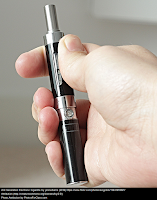I will admit, being a parent can be scary at times. Alcohol, drugs, bullying, peer pressure, dating, and today's topic…vaping. This is new for me, but recently there is a lot of talk about E-Cigarettes that are small enough to fit in the palm of your hand, they almost look like flash drives, so this appeals to students, as they are easy to conceal. The use of an e-cigarette basically heats a liquid into a vapor, which can then be inhaled. The liquid could be a flavored water type mixture, liquid nicotine or even THC, the active element of marijuana.
There is a product called JUUL that is being used. These devices are introducing teens to nicotine use. Besides their sleek design, the pods are flavored, so the taste is desirable to adolescents. Kids are calling it ‘Juuling’, as it sounds better than ‘vaping’, and kids don’t associate it with becoming addicted, because it's not a cigarette. What they don’t think about is that a single pod of a Juul has roughly the same amount of nicotine as one pack of cigarettes. Studies are stating that using E Cigarettes, like JUUL, is leading adolescents toward more risky behaviors. Students are able to do it in class, they quickly take a ‘hit’ and exhale into their sweatshirt hood. Because there is a sweet mild smell, it is not detected. Its easy to do in class when a teacher turns around, and equally easy to do in the bathroom. I explored the JUUL website a bit. The flavor pods are certainly made to look desirable. They are cute in size, and advertised with lovely pictures of brightly colored fruit, depending on the flavor. Certainly, the website clearly states you have to be 21 or over to purchase, and that this device os for adult smokers looking for an alternative to smoking.
Please see the links provided. Articles from New Hampshire Public Radio as well as an article from the Boston Globe. Boston Globe article NHPR article
What can we do? Communication is always key. Ask your child if they have heard of “Juuling”, or if they have tried it? Share your concerns with your child, why this is not a healthy choice, and what it could lead to.
I have found, even if the conversation is a tough one to have, its better to have it, than not at all.
Find other helpful links below:















